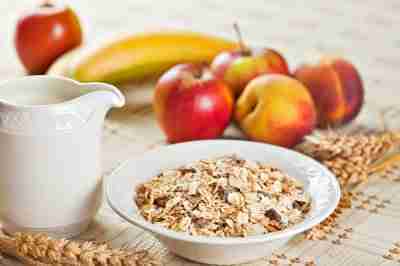Image Source: freedigitalphotos.net / Serge Bertasius Photography
Reducing Breast Cancer Risk With Dietary Fiber
There are many ways to reduce breast cancer risk with simple good nutrition, and one that many are unaware of is simply to get more fiber into your daily diet. We have some interesting studies that show us clearly how dietary fiber plays a role in cancer prevention, and that’s the focus of this article.
Researchers at Imperial College London were analyzing 16 different studies on dietary intake and breast cancer risk and reported that women who ate relatively large amounts of fiber had a 10% lower risk of being diagnosed with breast cancer. [1] In this study, researchers discovered that most of the reduced risk appeared to be related to a high intake of soluble fiber. In fact, eating 10 grams of soluble fiber per day was related to a whopping one-fourth lower risk of breast cancer. Those who ate more than 25 grams of soluble fiber per day enjoyed the greatest benefits.
So What Is Soluble Fiber?
Basically, soluble fiber dissolves in water whereas insoluble fiber does not. How these two forms of fiber are broken down in the gut is quite different and each is responsible for different health benefits.
Soluble fiber comes in the form of vegetables, fruits, grains, pasta, rice, dried fruit, and psyllium. Soluble fiber forms a gel-like mass in the gut, creating a sense of wellness, decreasing appetite, and promoting regular bowel movements. Mainly, soluble fiber helps the healthy bacteria in the gut reproduce and to stifle the production of bad, disease-causing bacteria. It is also associated with lowering the bad sort of cholesterol, LDL.
Insoluble Fiber Is Important Too
Insoluble fiber is found in whole grains and whole grain cereals, nuts, seeds, and dark leafy vegetables. Insoluble fiber is really important as well. It helps to prevent constipation and forms the basis of soft, bulky stools and it passes through the digestive tract largely intact. It is also responsible for controlling and balancing the pH (acidity) in the intestines, AND its other important function is to remove toxic waste through the colon as quickly as possible.
Most people don’t eat enough of either sort of fiber – the average intake is only about 15 grams per day. It is recommended that we consume between 25-35 grams of fiber per day. Keep in mind that the results of the first study I mentioned indicated that those who ate more than 25 grams of soluble fiber per day had the lowest risk of breast cancer.
So – it’s easy to say you need 25-35 grams of soluble fiber per day but what exactly does that equate to in real terms? Here’s a handy guide for you with some of the best foods that have high soluble fiber content:
1 cup Kellogg’s All Bran Buds = 7.60 g soluble fiber
1/2 cup passionfruit = 6.5 g soluble fiber
1 cup black beans = 4.8 g soluble fiber
1 tsp psyllium = 3.5 g soluble fiber
1 bowl of oatmeal made from 3/4 cup of dry oats = 3 g soluble fiber
1/2 cup avocado = 2.1 g soluble fiber
1/2 cup kidney beans = 2 g soluble fiber
1/2 cup Brussels sprouts = 2 g soluble fiber
1/4 cup dried figs = 1.9 g soluble fiber
1 small orange = 1.8 g soluble fiber
1/2 cup sweet potato = 1.8 g soluble fiber
1/2 cup asparagus = 1.7 g soluble fiber
1/2 small mango = 1.7 g soluble fiber
100 g quinoa – 1.5 g soluble fiber
1/2 cup chickpeas = 1.3 g soluble fiber
1 tablespoon ground flaxseed = 1.1 g soluble fiber
1 slice rye bread = 1 g soluble fiber
1/2 cup broccoli = 1 g soluble fiber
Keep in mind that many of the above-listed items also contain insoluble fiber.
Vegetable Fiber Is Also Protective
Two other studies reported that vegetable fiber was related to a decreased risk of breast cancer. [2], [3] No surprise there! We already know that we feel better when we eat ample quantities of fresh vegetables (remember – buy organic wherever possible, particularly if you are already fighting cancer).
Here’s a good visual image for you: Fill two-thirds of your plate with plant foods such as vegetables, whole grains, legumes, fruits and nuts, and one-third with lean or low-fat animal products (organic of course).
Experts agree – eating a plant-based diet that is rich in phytochemicals, antioxidants, fiber, and other plant compounds is the best way to protect against cancer. Remember some of the other factors as well – regular physical activity, not smoking, maintaining a healthy body weight, avoiding toxins in your food and body products, and keeping stress levels low.
References:
1. Dietary fiber and breast cancer risk: a systematic review and meta-analysis of prospective studies –http://www.ncbi.nlm.nih.gov/pubmed/22234738
2. Prospective association between dietary fiber intake and breast cancer risk — http://www.ncbi.nlm.nih.gov/pubmed/24244548
3. Dietary fiber intake and risk of hormonal receptor-defined breast cancer in the European Prospective Investigation into Cancer and Nutrition study — http://www.ncbi.nlm.nih.gov/pubmed/23269820
GET MY BEST TIPS on getting through breast cancer and preventing recurrences by signing up for my free e-newsletters and e-books on the right. You can also “like” me on Facebook (Marnie Clark, Breast Health Coach) to get my inspirational snippets, news and updates. I promise to do my utmost to keep you informed and empowered on your healing journey… and beyond.



